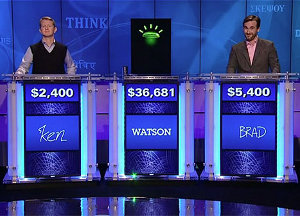
The supercomputer known as Watson made history this week when it soundly defeated Jeopardy champions Ken Jennings and Brad Rutter. The television friendly avatar at the podium concealed the massive number crunching power housed in the space of 10 refrigerators as Watson handily claimed the $1 million Jeopardy challenge prize.
Wired Magazine reported the 80 teraflop system was programmed by 25 IBM scientists over the last four years. During that time, researchers scanned some 200 million pages of content — or the equivalent of about one million books — into the system, including books, movie scripts and entire encyclopedias. All of which opens up a potential can of worms with regard to US Copyright Law.
In 2004, Google announced its intention to scan, digitize and make searchable the collections of five of the largest libraries in the world. Publishers and authors immediately reacted with claims of copyright violations. After all, if the contents of the books were available online, people wouldn’t be as inclined to purchase the books, and Google was not offering to otherwise compensate content creators for using their work. Not to mention that Google would be profiting from the content.
It’s highly unlikely IBM procured publishing rights to the millions of source works fed into Watson. Further, the content was used for profit when it won the $1 million prize. Undoubtedly, Jennings and Rutter have read numerous books as well, and also used that information for profit. But what does it mean for a machine to read a book? It’s clear that a human can read a book without violating the copyright, but humans lack total recall. Computers are not so limited. Watson could reproduce pages or entire works intact.
In the not terribly distant future, Watson, or similar artificially intelligent systems, will be connected to the Internet. They are the logical successor to services such as Wolfram Alpha that will be able to answer questions rather than merely return search results. They will necessarily have access to a wealth of copyrighted content.
The only thing that’s clear is that our century old copyright laws are ill-prepared to deal with this future. On the plus side, Skynet will never become self-aware and launch the Terminators to wipe out humanity because it will be unable to afford all the content licenses required to get that smart.
